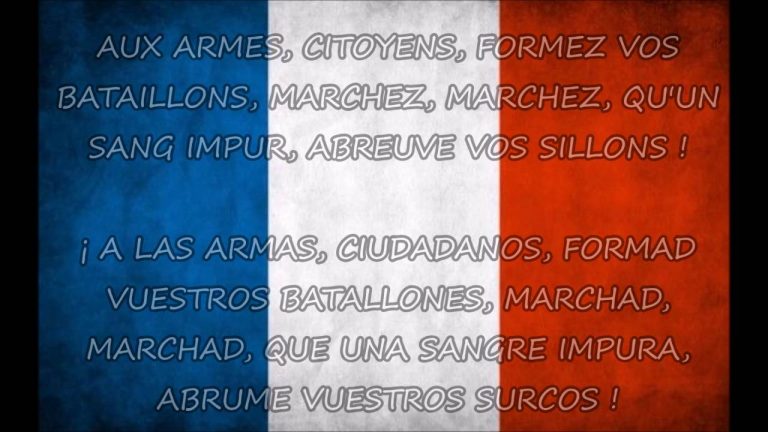Contenidos
Himno de francia letra en español
national anthem of france lyrics
Claude Joseph Rouget de Lisle was, at the time when the hymn was written, guest of the baron Philippe-Frédéric de Dietrich. One day, worried about the invasion of France by foreign monarchies (who sought to stop the French Revolution) Philippe-Frédéric de Dietrich asked Rouget de Lisle to compose a song that would lead the French troops to defend their country.
During the rule of Napoleon I, La Marseillaise lost its status as a national anthem. Louis XVIII and Charles X forbade singing it during their reigns. It was not until 1830, after another revolution in France, that it became the National Anthem again.
On a historical level, France is recognized worldwide for the French Revolution, a conflict that took place between 1789 and 1799, in which citizens rose up against the government, overthrew it and laid the foundations for what was to become Modern France. Both the National Anthem of France (La Marseillaise) and the slogan of the revolution «Liberty, Equality, Fraternity» have become international symbols, and have permeated the culture of the entire planet.
russian hymn english lyrics
On April 20, 1792, war was declared in Paris against Austria. When the mayor of Strasbourg heard the news, he invited a group of officers to his house for dinner on the evening of the 24th of the same month. In this group of officers was Claude Joseph Rouget de Lisle, captain of engineers of the garrison of Strasbourg. At that meeting, the mayor asked him to create a patriotic hymn for the event they were celebrating. Rouget de Lisle composed such a hymn and gave it the title Chant de guerre pour l’armée du Rhin («War Hymn for the Army of the Rhine») and dedicated it to Marshal Luckner.[1] Rouget de Lisle’s hymn was a very popular hymn.
Due to the high ignorance of the anthem among many young French people, the Fillon law for the reform of education adopted in March 2005, includes the obligation of learning the Marseillaise in kindergarten and primary education
Note: currently in France only the first stanza – and sometimes the sixth and seventh – and the refrain are sung. Mireille Mathieu recorded a version in which she sings La Marseillaise with the first, fifth and sixth stanzas, in addition to the refrain.
national anthem of france the marseillaise
On April 20, 1792, the war against Austria was declared in Paris. When the mayor of Strasbourg heard the news, he invited a group of officers to his house for dinner on the evening of the 24th of the same month. In this group of officers was Claude Joseph Rouget de Lisle, captain of engineers of the garrison of Strasbourg. At that meeting, the mayor asked him to create a patriotic hymn for the event they were celebrating. Rouget de Lisle composed such a hymn and gave it the title Chant de guerre pour l’armée du Rhin («War Hymn for the Army of the Rhine») and dedicated it to Marshal Luckner.[1] Rouget de Lisle’s hymn was a very popular hymn.
Due to the high ignorance of the anthem among many young French people, the Fillon law for the reform of education adopted in March 2005, includes the obligation of learning the Marseillaise in kindergarten and primary education
Note: currently in France only the first stanza – and sometimes the sixth and seventh – and the refrain are sung. Mireille Mathieu recorded a version in which she sings La Marseillaise with the first, fifth and sixth stanzas, in addition to the refrain.
lyrics of the anthem of france in french
On April 20, 1792, war was declared in Paris against Austria. When the mayor of Strasbourg heard the news, he invited a group of officers to his house for dinner on the evening of the 24th of the same month. In this group of officers was Claude Joseph Rouget de Lisle, captain of engineers of the garrison of Strasbourg. At that meeting, the mayor asked him to create a patriotic hymn for the event they were celebrating. Rouget de Lisle composed such a hymn and gave it the title Chant de guerre pour l’armée du Rhin («War Hymn for the Army of the Rhine») and dedicated it to Marshal Luckner.[1] Rouget de Lisle’s hymn was a very popular hymn.
Due to the high ignorance of the anthem among many young French people, the Fillon law for the reform of education adopted in March 2005, includes the obligation of learning the Marseillaise in kindergarten and primary education
Note: currently in France only the first stanza – and sometimes the sixth and seventh – and the refrain are sung. Mireille Mathieu recorded a version in which she sings La Marseillaise with the first, fifth and sixth stanzas, in addition to the refrain.







